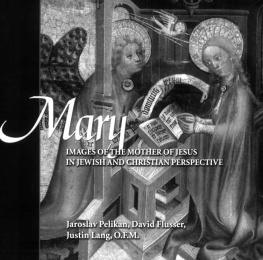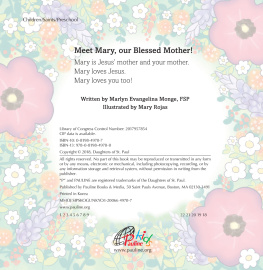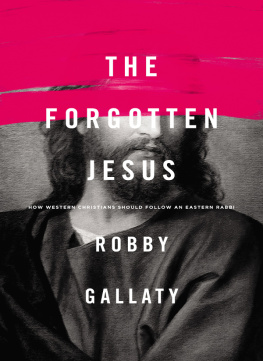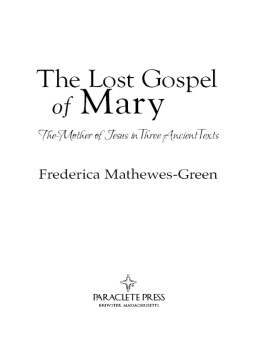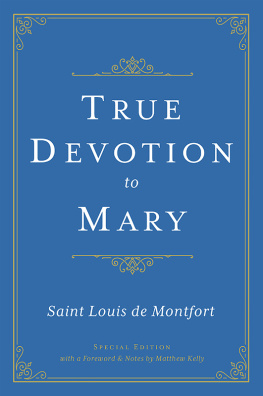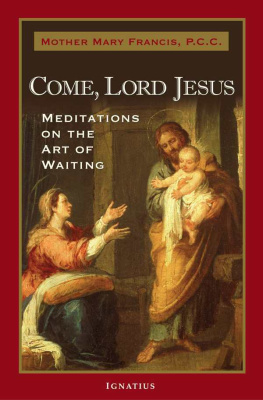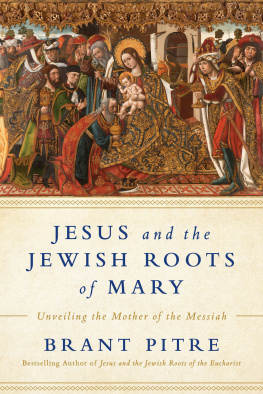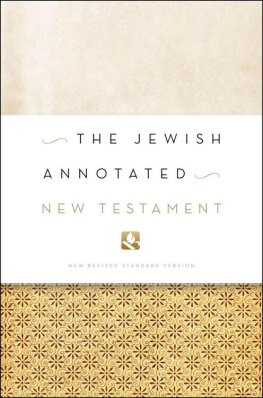Jaroslav Pelikan - Mary - Images of Mother of Jesus in Jewish and Christian Perspective
Here you can read online Jaroslav Pelikan - Mary - Images of Mother of Jesus in Jewish and Christian Perspective full text of the book (entire story) in english for free. Download pdf and epub, get meaning, cover and reviews about this ebook. year: 2007, genre: Religion. Description of the work, (preface) as well as reviews are available. Best literature library LitArk.com created for fans of good reading and offers a wide selection of genres:
Romance novel
Science fiction
Adventure
Detective
Science
History
Home and family
Prose
Art
Politics
Computer
Non-fiction
Religion
Business
Children
Humor
Choose a favorite category and find really read worthwhile books. Enjoy immersion in the world of imagination, feel the emotions of the characters or learn something new for yourself, make an fascinating discovery.
- Book:Mary - Images of Mother of Jesus in Jewish and Christian Perspective
- Author:
- Genre:
- Year:2007
- Rating:4 / 5
- Favourites:Add to favourites
- Your mark:
- 80
- 1
- 2
- 3
- 4
- 5
Mary - Images of Mother of Jesus in Jewish and Christian Perspective: summary, description and annotation
We offer to read an annotation, description, summary or preface (depends on what the author of the book "Mary - Images of Mother of Jesus in Jewish and Christian Perspective" wrote himself). If you haven't found the necessary information about the book — write in the comments, we will try to find it.
Mary - Images of Mother of Jesus in Jewish and Christian Perspective — read online for free the complete book (whole text) full work
Below is the text of the book, divided by pages. System saving the place of the last page read, allows you to conveniently read the book "Mary - Images of Mother of Jesus in Jewish and Christian Perspective" online for free, without having to search again every time where you left off. Put a bookmark, and you can go to the page where you finished reading at any time.
Font size:
Interval:
Bookmark:

IN JEWISH AND CHRISTIAN PERSPECTIVE
Jaroslav Pelikan
David Flusser
Justin Lang, O.F.M.
 'arv, the mother of Jesus, has attracted loving devotion and avid dedication among Christians for two thousand years. A humble Jewish girl, little mentioned 'in the New Testament accounts of Jesus, she has nonetheless been acclaimed Mother of God and Queen of heaven, while vast cathedrals-setting into stone and glass the lofty aspiration and the skilled labor of many generations-have been dedicated to her honor. Millions invoke her name in prayer each hour.
'arv, the mother of Jesus, has attracted loving devotion and avid dedication among Christians for two thousand years. A humble Jewish girl, little mentioned 'in the New Testament accounts of Jesus, she has nonetheless been acclaimed Mother of God and Queen of heaven, while vast cathedrals-setting into stone and glass the lofty aspiration and the skilled labor of many generations-have been dedicated to her honor. Millions invoke her name in prayer each hour.
Yet the cult of the virgin has also ignited great controversy and even antipathy. In the early centuries Christians disputed her title Mother of God. Later, especially during the late Middle Ages and the Reformation, Christians denounced a devotional focus on Mary that seemed sometimes to eclipse that of Jesus himself. Still, even the reformer Martin Luther, although often bitterly critical of the cult of saints, spoke lovingly of the figure of Mary as the holy Mother of God and an exemplar of faith.
What is it that Christians have found in devotion to Mary, and what is her enduring relevance for people of faith today? In this volume, now after two decades brought into a paperback edition, three eminent historians offer sympathetic and insightful reflections-Jewish, Protestant, and Catholic-on the historical, theological, and above all spiritual significance of the mother of Jesus and Christian regard for her. Their volume pivots around some of the most beautiful Christian images of Mary, gathered into a cycle of depictions of her life. Drawn mainly from stunning medieval altarpieces, these illustrations of events from the Gospels and popular Christian literature and legends eloquently illumine popular piety and devotion to Mary.
The chapter by the late Jewish New Testament scholar David Flusser finds the key to Mary in her Jewish identity and her embodiment of the suffering and hopes of the people Israel, poignantly and ironically pertinent in light of subsequent centuries of Jewish suffering at the hands of Christians and in our time of the Holocaust. Yale historian Jaroslav Pelikan then masterfully outlines the development of Christian conviction about Mary after the New Testament period, especially as illustrated in the plates. He shows how Mariological doctrine reflected popular piety and ultimately reflected the significance of Jesus himself and the very character of redemption. Finally, Franciscan friar Justin Lang portrays devotion to Mary, especially as it appears in the liturgical feasts, prayers, hymns, images, and legends of popular Catholicism, in its ongoing role in our personal and ecclesial search for salvation and intimacy with God.
With today's increased interest in the historical figure and religious import of the mother of Jesus, this triptych of meditations reveals something of what ordinary Christians have seen in Mary for millennia: a woman of grace who did not hesitate to surrender herself to God and to open herself to all the joy and pain that her pivotal role in redemption would entail.
-The editors
 hat I write here is to be taken as meditation of a human being who has once again been chosen and condemned to play on the Jewish fiddle in the three tones of Catholic-Protestant-Jew. But within this ecumenical prison in which I am forced to sit, no one can deny me the right to sing a proper song of praise to the Jewish Mary, even when I run the danger of being fruitfully or fearfully misunderstood by those who will pass by my golden latticework. This is not going to be a pastoral idyll on the Jewish mother Mary, for her life was certainly not idyllic-not according to the version of any confession! It is clear to me that I owe Mary a meditation and one that is independent of the dogmatic developments of the different denominations and perhaps unimpaired by dogmatic positions.
hat I write here is to be taken as meditation of a human being who has once again been chosen and condemned to play on the Jewish fiddle in the three tones of Catholic-Protestant-Jew. But within this ecumenical prison in which I am forced to sit, no one can deny me the right to sing a proper song of praise to the Jewish Mary, even when I run the danger of being fruitfully or fearfully misunderstood by those who will pass by my golden latticework. This is not going to be a pastoral idyll on the Jewish mother Mary, for her life was certainly not idyllic-not according to the version of any confession! It is clear to me that I owe Mary a meditation and one that is independent of the dogmatic developments of the different denominations and perhaps unimpaired by dogmatic positions.
As a Jew, I find myself in a paradoxical situation in comparison to most Protestants. In connection with Mary, I am not in danger of having to react automatically with compulsive resentment. I understand how such a cramped reaction to Mary originated among the "separated brethren." There were and are even to this day many exaggerations and even blunders within the devotion to Mary. Erasmus of Rotterdam had already taken those to task who "rely more on the virgin Mother of God than on her Son" (The Praise of Folly, chap. 40).
The second reason for the tension in relation to Mary is the Protestant criticism of the ecclesial tradition and of the binding validity of the dogmatic decisions of the old and new councils. Protestants can all the more easily criticize devotion to Mary because they hold that the New Testament alone is binding and they find there skimpy shorings for a Mariology.
But there is a third reason for the Protestant sort of negative reaction to devotion to Mary. This reason is, at least for me, the least defensible. There developed among Protestants a long time ago an almost superstitious fear with regard to holiness and sanctification. This fear has occurred because they see the danger of an alleged holiness and sanctification turning out to be a pagan superstition. In itself, this is a justifiable attitude, but it can easily cause one to fall into the opposite extreme. One could, so to speak, be throwing out the baby with the bathwater, and authentic holiness and sanctification could fall under suspicion as a result. In the Catholic church and related churches, Mary is understood as the vessel of holiness because she is the mother of Jesus. The thoroughgoing fear of an inauthentic holiness that can lead to idol worship is the third reason so many-including many Catholics-shrink away from the high regard in which Mary is held.
For Judaism of all times and types, holiness is bound to a place and to a definite time and is called forth through a definite activity; it is an integral part of the Jewish religious system. A Jew is capable of experiencing holiness. For that reason it seems to me that a Jew does not labor under the same inhibitions in developing an appreciation for the holiness of Mary in the church which makes it difficult for many a Christian to understand the devotion to Mary that is maintained by his or her Catholic counterpart. On the other hand, I must admit that, whether one is a Jew or a non-Jew, it is not easy to develop an appreciation of the devotion to Mary when one has not been raised on it as has the Catholic child who is initiated into this devotion at its mother's breast. One should not criticize Jews or Protestants because of that.
I have simply expressed some theoretical presuppositions necessary to set the tone for developing the basic meaning and explanation of Mary. In the course of our considerations we should not forget that we are speaking of a real, actually living, Jewish woman. This fact at least should arouse in everyone a semblance of respect for the historical foundations in Mary's regard. Another theoretical consideration: both Judaism and Christianity are ways of faith whose points of departure are historical facts. And there is, as we know, no way without a starting point. For that reason, the historicity of Mary and the reality of her glory and her suffering are the foundation of her devotion among Christians. And the tragedy of this Jewish woman is an aspect of the uninterrupted way of suffering of her own people, the Jews.
Font size:
Interval:
Bookmark:
Similar books «Mary - Images of Mother of Jesus in Jewish and Christian Perspective»
Look at similar books to Mary - Images of Mother of Jesus in Jewish and Christian Perspective. We have selected literature similar in name and meaning in the hope of providing readers with more options to find new, interesting, not yet read works.
Discussion, reviews of the book Mary - Images of Mother of Jesus in Jewish and Christian Perspective and just readers' own opinions. Leave your comments, write what you think about the work, its meaning or the main characters. Specify what exactly you liked and what you didn't like, and why you think so.

